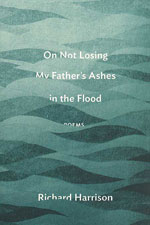 Richard Harrison’s wise and approachable poetry collection On Not Losing My Father’s Ashes in the Flood has the satisfying cohesiveness of linked short stories. His meditations on mortality are grounded in rueful realities, from the collection’s titular tragicomedy to the telling observations of lovers, children and even golfing partners. Those meditations become transcendent as and because they take the body as their humble starting point, as in the poignant “With the Dying of the Light”:
Richard Harrison’s wise and approachable poetry collection On Not Losing My Father’s Ashes in the Flood has the satisfying cohesiveness of linked short stories. His meditations on mortality are grounded in rueful realities, from the collection’s titular tragicomedy to the telling observations of lovers, children and even golfing partners. Those meditations become transcendent as and because they take the body as their humble starting point, as in the poignant “With the Dying of the Light”:
“It is here now, what that hand held when it held itself up,
the lull before the poem begins,
the surrender when it’s done.”
You can sense Harrison’s craft and thought in every line and stanza. He often muses in his poems about writing poems and about others being aware that he is framing and composing as he is experiencing. That doesn’t come across as forced or pretentious, though, but as disarmingand self-effacing.
The concluding poem of the collection, “Haiku”, captures beautifully Harrison’s process and his wry consciousness of that process.
It demands haiku,
bee within chrysanthemum.
Damn, I got nothing.But that quits the moment
and the moment is too much a moment to quit –
With that, we’re given simple encouragement to not quit our own moments, whatever we’re striving for, so we don’t miss out on moments of quiet discovery and resolution such as …
At last the man sees
the poem is the woman’s hand
resting in his own.
On Not Losing My Father’s Ashes in the Flood by Richard Harrison (Wolsak and Wynn, 2016)
